- What is 7050 Grade Aluminum?
- 7050 Aluminum Plate Specifications
- 7050 Aluminum Plate Thickness Tolerance
- Mechanical Properties of 7050 Aluminum Plate
- 7050 Aluminum Plate Supplier
- Typical 7050 Aluminum Plate
- 7050 Aluminum Plate Applications
- 7050 Aluminum Plate Chemical Composition
- 7050 Aluminum Plate Hot Topics of Customer Consultation
- What is the Difference between 6061 and 7050 Aluminum Plate?
- What is the Difference between 7050 and 7075 Aluminum Plate?
What is 7050 Grade Aluminum?
7050 Aluminum is a high strength alloy commonly used in aerospace and defense applications. It has an excellent strength to weight ratio, good toughness and resistance to stress corrosion cracking. T7451 and T7651 tempers are commonly used in sheet applications and offer different combinations of strength and ductility.
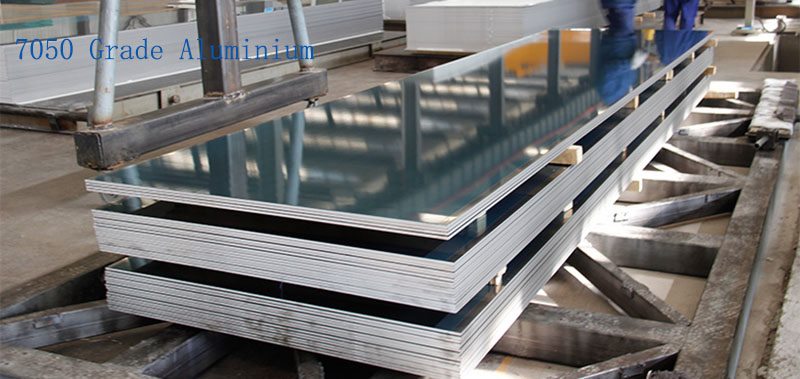
7050 Aluminum Plate Specifications
- Thickness : 0.016-6.0 inches (0.4-152.4mm)
- Width : Up to 96 inches (2438 mm)
- Length : Up to 288 inches (7315 mm)
- Standards : ASTM B209, AMS 4050, AMS 4342, AMS 4201, AMS 4340, AMS 4202, AMS 4204, AMS 4203
- Equivalent : 7050 T7451, 7050 T7651
- These specifications are generalized and may vary with specific products and manufacturing processes.
7050 Aluminum Plate Thickness Tolerance
The thickness tolerance of 7050 aluminum sheet will vary according to the specific manufacturing process and the thickness of the sheet. However, in general, the standard thickness tolerance for 7050 aluminum sheet is usually ±0.005 inches (0.13 mm).
It should be noted that the thickness tolerance is also affected by the type of sheet processing, such as whether it is hot-rolled or cold-rolled. In addition, factors such as temperature and pressure applied during the manufacturing process can also affect thickness tolerances.
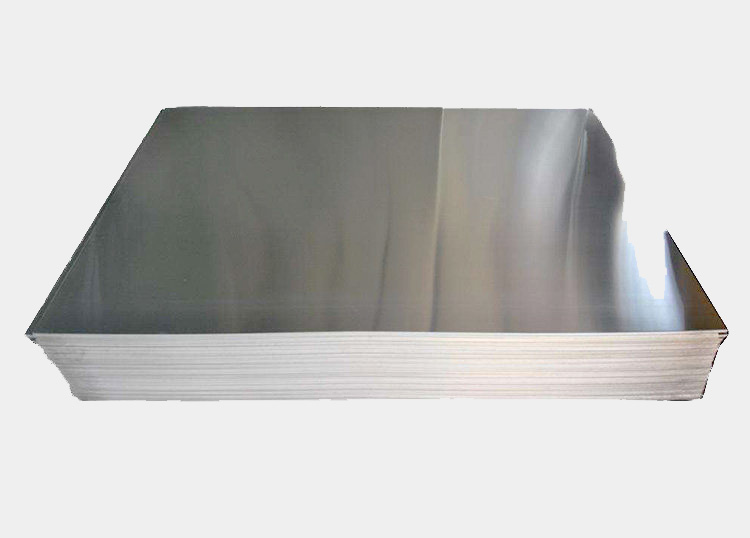
If your application requires specific thickness tolerances, it is advisable to consult with the manufacturer or supplier of the 7050 aluminum sheet to ensure it meets your requirements.
Mechanical Properties of 7050 Aluminum Plate
| GRADE | TEMPER | TENSILE-KSI | YIELD-KSI | ELONGATION- % |
| 7050 | T7451 | 74 | 64 | 10 |
| T7651 | 77 | 67 | 9 |
| Material | Temper | Thickness | Tensile Strength (ksi) | Yield Strength (ksi) | Elongation in 2" % |
| Alloy 7050 Plate (longitudinal) | T7451 | <2.0 | 74 | 64 | 10 |
| Alloy 7050 Plate (longitudinal) | T7451 | 2.0 -3.0 | 73 | 63 | 9 |
| Alloy 7050 Plate (longitudinal) | T7451 | 3.0 - 4.0 | 72 | 62 | 9 |
| Alloy 7050 Plate (longitudinal) | T7451 | 4.0 - 5.0 | 71 | 61 | 9 |
| Alloy 7050 Plate (longitudinal) | T7651 | 0.25 - 1.0 | 76 | 66 | 9 |
| Alloy 7050 Plate (longitudinal) | T7651 | 1.0 - 1.5 | 77 | 67 | 9 |
| Alloy 7050 Plate (longitudinal) | T7651 | 1.5 - 2.0 | 76 | 66 | 9 |
| Alloy 7050 Plate (longitudinal) | T7651 | 2.0 - 3.0 | 76 | 66 | 8 |
7050 Aluminum Plate Supplier
- Material Selection : Raw materials comply with the specified chemical composition and are of consistent quality throughout the board.
- Melting and casting : Raw materials are melted in furnaces and cast into slabs using a continuous casting process. Ensure consistent material quality throughout the board.
- Homogenization : The strand is homogenized in the furnace to eliminate any residual stress and ensure homogeneity of the material.
- Hot rolling : Hot rolling the homogenized slab to the required thickness to ensure the correct thickness and uniform grain structure.
- Heat Treatment : The hot rolled sheet is then heat treated to the appropriate specifications to achieve the desired material properties such as strength and toughness.
- Surface Treatment : Sheets may undergo surface treatments such as polishing or anodizing to improve their appearance or corrosion resistance.
- Quality Control : Throughout the manufacturing process, quality control checks are performed to ensure that the panels meet the required specifications and are of high quality. These inspections include visual inspections, dimensional measurements and material testing.
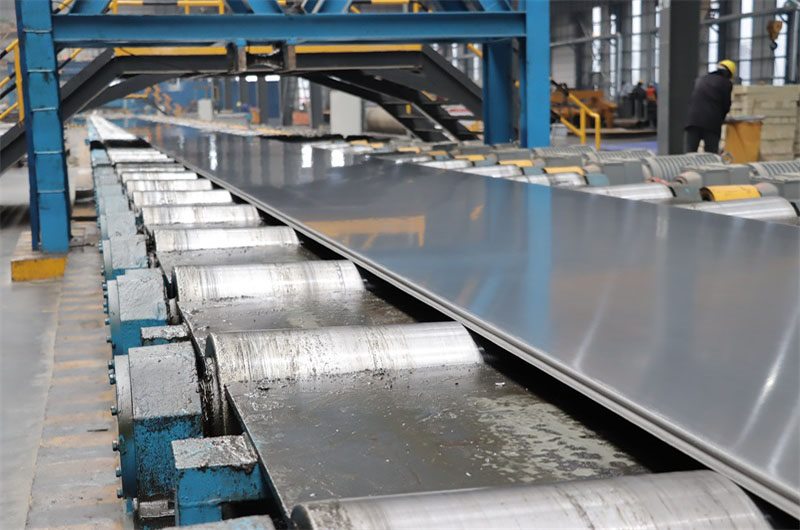
Typical 7050 Aluminum Plate
Al 7050 T7451
Al 7050 T7451 Aluminum is a heat treatable alloy that has been drawn and artificially aged. It has high strength and good resistance to stress corrosion cracking, making it a popular choice for aircraft structures and other high-stress applications.
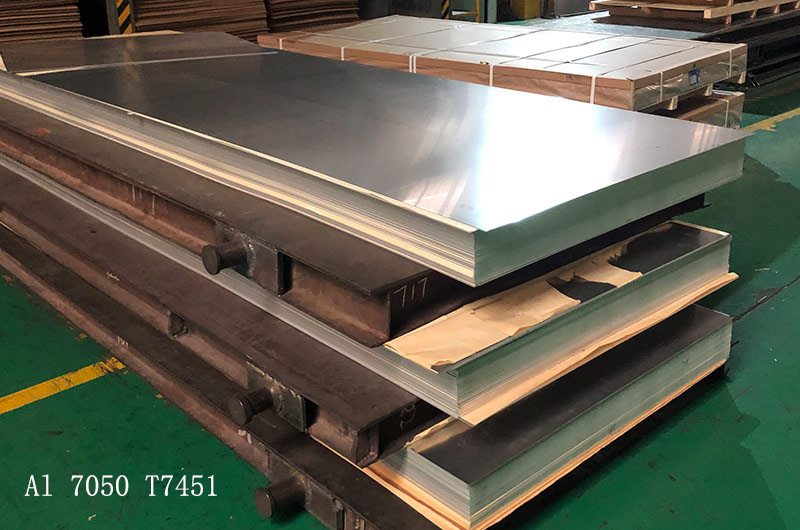
Al 7050 T74511
Al 7050 T74511 Aluminum is a variant of Al 7050 T7451 with increased fracture toughness and resistance to fatigue crack growth. It is commonly used in critical structural applications such as wing and fuselage skins.
7050 T7452 Aluminum Plate
7050-T7452 Aluminum is a heat treatable alloy that offers high strength and good resistance to stress corrosion cracking. It is similar to 7050 T7451 but has higher fracture toughness and fatigue resistance.
7050 T7351 Aluminum Plate
7050 T7351 Aluminum is also a heat treatable alloy with similar properties to 7050 T6 but with increased resistance to stress corrosion cracking. It is commonly used in aerospace and defense applications.
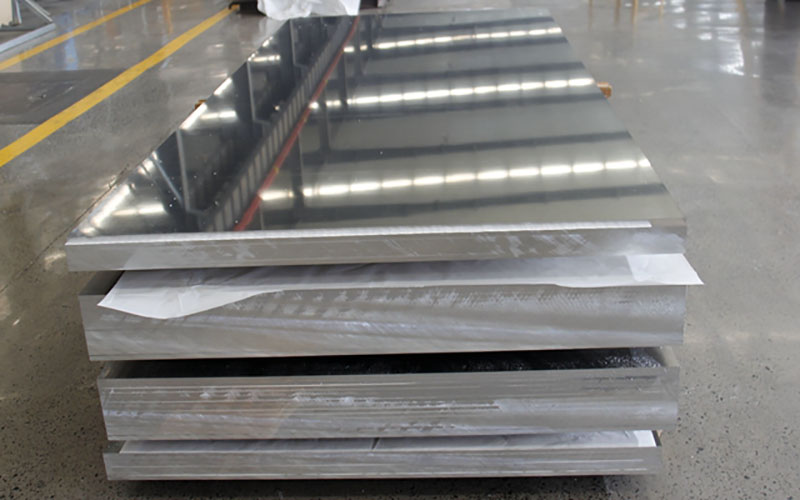
Al 7050 T74 Plate
7050 T74 Aluminum is a cold worked and naturally aged alloy that offers high strength and good corrosion resistance. It is commonly used in structural applications requiring excellent fatigue resistance.
7050 T6 Aluminum Plate
7050 T6 aluminum is a heat treatable alloy with good mechanical properties and high strength. It has excellent toughness and fatigue resistance, making it a popular choice for aircraft structures and other high-stress applications. The T6 designation indicates that the aluminum has been solution heat treated and artificially aged.
7050 T7651 Aluminum Plate
7050 T7651 Aluminum is a heat treatable alloy with high strength and good resistance to stress corrosion cracking. It is commonly used in applications requiring high strength and toughness, such as aircraft wing spars and landing gear components.
7050 Aluminum Plate Applications
7050 aluminum sheet is a high-strength alloy commonly used in aerospace and defense applications. Its excellent strength-to-weight ratio, good toughness and resistance to stress corrosion cracking make it a popular choice for components requiring high strength and durability. Some common applications for 7050 aluminum sheet include :
7075 Aerospace Aluminum Structural Parts
7050 aluminum is used to make aircraft wings, fuselages and other structural parts that require high strength and stiffness.
- Status/Specification : T7451, AMS 4050, AMS 4342
- Specific components : wings, fuselage, bulkheads, landing gear components, engine components
- Why it's used : The high strength and toughness of 7050 aluminum make it ideal for use in aircraft structural parts that require a high strength-to-weight ratio, fatigue resistance, and durability.
Click to learn more aboutAerospace Aluminum Plate
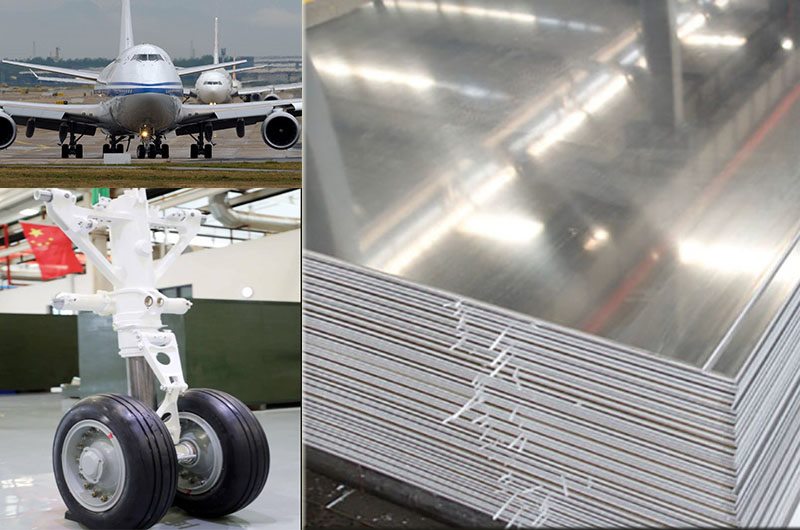
Missile Parts
7050 aluminum is used in the manufacture of missile components such as airframe skins and structures.
- Status/Specification : T7651, AMS 4342
- Specific components : Fuselage skin, structural parts
- Why use it : 7050 aluminum's high strength and resistance to stress corrosion cracking make it a good choice for missile components that require high performance under extreme conditions.
Spacecraft Parts
7050 aluminum is used in the construction of spacecraft components such as fuel tanks and structural members.
- Status/Specification : T7451, AMS 4050
- Specific components : Fuel tanks, structural parts
- Why use it : 7050 aluminum's high strength and resistance to stress corrosion cracking make it a good choice for spacecraft components that require high performance under extreme conditions.
7050 Aluminum Plate for Sporting Goods
7050 aluminum is used in the manufacture of high performance sporting goods such as bicycle frames and baseball bats.
- Status/Specification : T6, AMS 4050
- Specific Parts : Bicycle Frames, Baseball Bats
- Application examples : Trek Madone bike frame, Easton baseball bat
- Why it's used : 7050 aluminum's high strength and stiffness make it ideal for high-performance sporting goods that require a lightweight, durable, and stiff material.
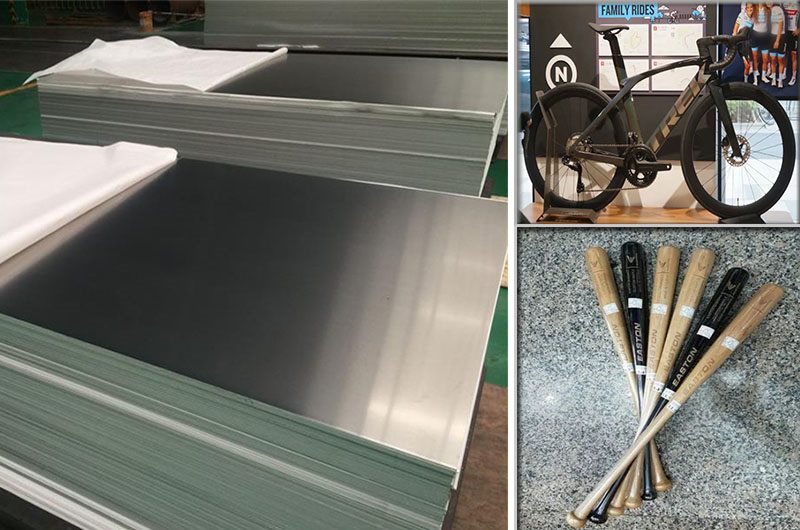
7050 Marine Aluminum
7050 aluminum is used in the construction of boats and other marine equipment because of its corrosion resistance and high strength.
- Status/Specification : T7451, AMS 4050
- Specific components : boats, marine equipment
- Application examples : high-speed patrol boats, offshore oil platform equipment
- Why it's used : 7050 aluminum's high strength, corrosion resistance, and toughness make it ideal for use in marine applications, which require a material that can withstand harsh saltwater environments and high stresses.
Click to learn more aboutMarine Grage Aluminum Plate
High Stress Structural Applications
7050 aluminum is used in a variety of high-stress structural applications where strength, durability, and fatigue resistance are critical.
- Status/Specification : T7651, AMS 4342
- Specific parts : bridge components, pressure vessels, high-performance automotive components
- Application Examples : Golden Gate Bridge Tower Hangers, Natural Gas Storage Pressure Vessels, High Performance Automotive Suspension Components
- Why it's used : 7050 aluminum's high strength, toughness, and resistance to stress corrosion cracking make it ideal for use in high-stress structural applications that require a material capable of withstanding extreme loads and environmental conditions.
7050 Aluminum Plate Chemical Composition
| Chemical Composition | Limits (WT %) |
| Silicon | 0.12 |
| Iron | 0.15 |
| Copper | 2.0-2.6 |
| Manganese | 0.1 |
| Magnesium | 1.9-2.6 |
| Chromium | 0.04 |
| Zinc | 5.7-6.7 |
| Titanium | 0.06 |
| Others, each | 0.05 |
| Others, total | 0.15 |
7050 Aluminum Plate Hot Topics of Customer Consultation
7050 T7451 AMS 4050
AMS 4050 is the Society of Automotive Engineers (SAE) specification for 7050-T7451 aluminum alloys that covers the chemical composition, mechanical properties, and heat treatment requirements for alloys commonly used in aerospace and other high-stress applications.
- Al T7451 : Indicates that aluminum has been solution heat treated and then artificially aged, resulting in a material with high strength, good fracture toughness and resistance to stress corrosion cracking.
- AMS 4050 T7451 : Specifies the same material and heat treatment requirements as AMS 4050, but specifically identifies the T7451 temper designation.
- 7050 T7451 Per AMS 4050 : Indicates that the material meets the requirements of AMS 4050 for the T7451 temper designation.
7050 T74511 AMS 4342
AMS 4342 is the Society of Automotive Engineers (SAE) specification for the 7050-T74511 aluminum alloy. The specification covers specific heat treatment processes for alloys, including solution heat treatment followed by a two-step aging process.
The T74511 temper designation indicates that aluminum has been solution heat treated, then aged at a specific temperature for a specific time, resulting in a material with high strength and toughness.
AMS 4050 Aluminum
AMS 4050 is consistent with 7050 T7451 AMS 4050. AMS 4050 specifies the chemical composition, mechanical properties and heat treatment requirements of 7050-T7451 aluminum alloy plates.
If you are planning to purchase 7050-T7451 aluminum alloy sheets, it is important to ensure that they meet the requirements of AMS 4050 to ensure they are suitable for your intended application.
What is the Difference between 6061 and 7050 Aluminum Plate?
7050 Aluminum is a stronger alloy than 6061, but is also more difficult to machine.
-
Element :
- 6061 aluminum contains 0.6-1.2% magnesium, 0.25% chromium and 0.15% copper.
- 7050 aluminum contains 2.0-2.6% magnesium, 1.9-2.6% zinc, and 5.7-6.7% copper.
- Strength : 7050 aluminum is stronger than 6061 aluminum with a yield strength of 73, 000 psi compared to 6061's 40, 000 psi.
- Toughness : 6061 aluminum has better toughness than 7050 aluminum, which means it can withstand shocks and sudden loads better.
- Corrosion resistance : Both alloys have good corrosion resistance, but 6061 aluminum has better resistance to stress corrosion cracking.
- Weldability : 6061 aluminum is easier to weld than 7050 aluminum and requires more skill and care.
What is the Difference between 7050 and 7075 Aluminum Plate?
7075 aluminum is stronger, but 7050 aluminum is tougher and more resistant to fatigue. Both alloys are popular choices for high-performance applications, and they are often used together in different parts of aircraft or other complex systems.
-
Element :
- 7050 aluminum contains 5.7-6.7% copper, 2.0-2.6% magnesium, 1.9-2.6% zinc, and 0.08-0.15% zirconium.
- 7075 aluminum contains 1.2-2.0% copper, 2.1-2.9% magnesium, 5.6-6.1% zinc, and less than 0.5% of other elements.
-
Strength : Both alloys have high strength, but 7075 aluminum is stronger than 7050 aluminum.
- 7075-T651 has a tensile strength of 83, 000 psi.
- 7050 T7451 has a tensile strength of 76, 000 psi.
- Toughness : 7050 aluminum has better toughness than 7075 aluminum, which means it can withstand shocks and sudden loads better.
- Corrosion resistance : Both alloys have good corrosion resistance, but 7075 aluminum has better resistance to stress corrosion cracking.
- Weldability : Both alloys are weldable, but 7050 aluminum is generally considered to be more difficult to weld than 7075 aluminum.
